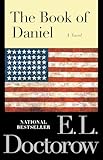 Today I began teaching E.L. Doctorow’s The Book of Daniel in my first-year writing seminar at Fordham. I feel kind of bad about it. They’re nice kids, and they don’t deserve the royal butt-kicking Doctorow’s underappreciated Vietnam-era novel dishes out.
Today I began teaching E.L. Doctorow’s The Book of Daniel in my first-year writing seminar at Fordham. I feel kind of bad about it. They’re nice kids, and they don’t deserve the royal butt-kicking Doctorow’s underappreciated Vietnam-era novel dishes out.
Edgar Lawrence Doctorow, now 81, occupies an avuncular place in our literary culture. He has been an eminence grise in the NYU creative writing program for many years, and before his rise as a writer in his own right, he was editor-in-chief at The Dial Press where he edited the likes of Norman Mailer, James Baldwin, and William Kennedy. With his bald pate and genial, bearded countenance, the guy just looks nice. But as we know from books, looks can be deceiving.

 A grandchild of Russian Jewish immigrants raised in the depths of the Great Depression, Doctorow often centers his historical novels around violent insurgents bent on overturning a smug, wealthy elite. Ragtime, perhaps his best-known book, sets a white upper-middle class family that owes its fortune to the production of American flags and fireworks against a family of poor Jewish immigrants who find solace in the politics of anarchist Emma Goldman, and a fictional black jazz musician named Coalhouse Walker, who turns violent after white policemen kill his wife. The March follows General William Tecumseh Sherman on his scorched-earth March to the Sea from Atlanta to Savannah in the waning months of the Civil War.
A grandchild of Russian Jewish immigrants raised in the depths of the Great Depression, Doctorow often centers his historical novels around violent insurgents bent on overturning a smug, wealthy elite. Ragtime, perhaps his best-known book, sets a white upper-middle class family that owes its fortune to the production of American flags and fireworks against a family of poor Jewish immigrants who find solace in the politics of anarchist Emma Goldman, and a fictional black jazz musician named Coalhouse Walker, who turns violent after white policemen kill his wife. The March follows General William Tecumseh Sherman on his scorched-earth March to the Sea from Atlanta to Savannah in the waning months of the Civil War.
As good as these books are – and they are good – they keep these historical fire-breathers safely in the past, dead and buried and of no threat to us. This is what makes The Book of Daniel an outlier on the Doctorow bookshelf. Published in 1971, Daniel tells the story of accused Communist spies Ethel and Julius Rosenberg – called the Isaacsons in the novel – from the perspective of their son, Daniel, who is not merely still alive, but over the course of the novel becomes deeply enmeshed in one of the principal historical movements of his day, the fight against the Vietnam War.
As a literary conceit, this is in itself daring. The Rosenbergs, when they were executed in 1953, did have two children, Michael and Robert Meeropol, both still living today, and both former academics long aligned with left-wing causes. In the novel, the two brothers morph into Susan, a mentally unstable twenty-year-old college student involved in the protests against the Vietnam War, and her older brother Daniel, a twenty-four-year-old Columbia University graduate student trying to finish his dissertation. The novel is that dissertation, or rather, the crazy mishmash of autobiography, historical analysis, self-justification, and blind rage that Daniel pours out onto the page after he learns that his sister has attempted suicide after being betrayed by the anti-war New Left.
Structured in this way, and set during the long hot summer of 1967, the novel poses the question: What would it be like to know that your own government, in a fit of mass political hysteria, murdered your parents? How would you relate to such a government? And, more importantly, how would you function if you saw your country entering a new phase of political hysteria against a phantom Communist menace, this time located half a world away in North Vietnam, that appears likely to consume the last remaining member of your family, your own baby sister?
Daniel at first responds to this crisis by going mad, and it is this, Doctorow’s depiction of a very bright, very angry young man losing his grip on his senses, in real time, right there on the page before you, that gives the book its taut drama. But what makes the book work as fiction is that Doctorow never loses his grip, not for a second. Daniel is a horror show: cruel, vituperative, physically abusive toward his young wife, and at times just this side of clinically psychotic. The text he produces is fractured and wild, careening from first-person to third-person perspective, from engrossing family narrative to dry historical analysis, from quirkily annotated lists to long, barely coherent rantings from Daniel’s crazy Russian grandmother – and yet the whole thing, if you take the time to read it carefully, makes perfect sense.
The Book of Daniel is metafiction done right, by an author who cares as much about telling stories as he does about talking about telling stories. And just as that other great modern metafictional triumph, Tim O’Brien’s The Things They Carried, is the smartest book about the experiences of soldiers in the Vietnam War, The Book of Daniel is the smartest book I know about the home front during that war.









